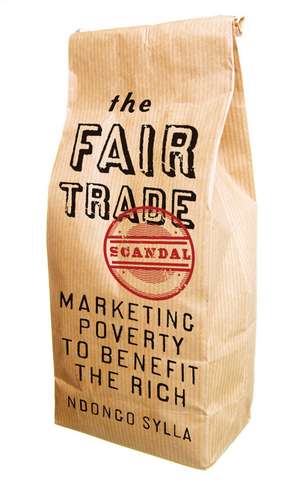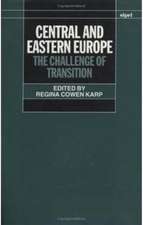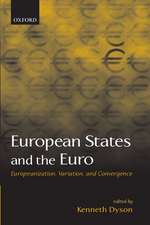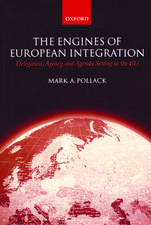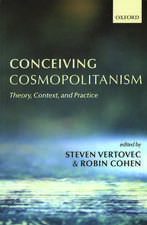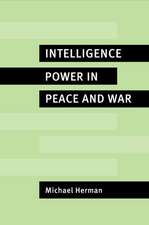The Fair Trade Scandal: Marketing Poverty to Benefit the Rich
Autor Ndongo Syllaen Limba Engleză Paperback – 31 ian 2014
This critical account of the fair trade movement explores the vast gap between the rhetoric of fair trade and its practical results for poor countries, particularly those of Africa. In the Global North, fair trade often is described as a revolutionary tool for transforming the lives of millions across the globe. The growth in sales for fair trade products has been dramatic in recent years, but most of the benefit has accrued to the already wealthy merchandisers at the top of the value chain rather than to the poor producers at the bottom.
Ndongo Sylla has worked for Fairtrade International and offers an insider’s view of how fair trade improves—or doesn’t—the lot of the world’s poorest. His methodological framework first describes the hypotheses on which the fair trade movement is grounded before going on to examine critically the claims made by its proponents. By distinguishing local impact from global impact, Sylla exposes the inequity built into the system and the resulting misallocation of the fair trade premium paid by consumers. The Fair Trade Scandal is an empirically based critique of both fair trade and traditional free trade; it is the more important for exploring the problems of both from the perspective of the peoples of the Global South, the ostensible beneficiaries of the fair trade system.
Ndongo Sylla has worked for Fairtrade International and offers an insider’s view of how fair trade improves—or doesn’t—the lot of the world’s poorest. His methodological framework first describes the hypotheses on which the fair trade movement is grounded before going on to examine critically the claims made by its proponents. By distinguishing local impact from global impact, Sylla exposes the inequity built into the system and the resulting misallocation of the fair trade premium paid by consumers. The Fair Trade Scandal is an empirically based critique of both fair trade and traditional free trade; it is the more important for exploring the problems of both from the perspective of the peoples of the Global South, the ostensible beneficiaries of the fair trade system.
Preț: 259.54 lei
Nou
Puncte Express: 389
Preț estimativ în valută:
49.66€ • 51.99$ • 41.09£
49.66€ • 51.99$ • 41.09£
Carte tipărită la comandă
Livrare economică 07-21 aprilie
Preluare comenzi: 021 569.72.76
Specificații
ISBN-13: 9780821420928
ISBN-10: 0821420925
Pagini: 224
Dimensiuni: 140 x 216 x 18 mm
Greutate: 0.2 kg
Ediția:1
Editura: Ohio University Press
Colecția Ohio University Press
ISBN-10: 0821420925
Pagini: 224
Dimensiuni: 140 x 216 x 18 mm
Greutate: 0.2 kg
Ediția:1
Editura: Ohio University Press
Colecția Ohio University Press
Recenzii
“…A meticulously argued exploration of the fair trade movement, its economic effects in both the Global North and South, and how it lives up to its own goals. The Fair Trade Scandal is not an attack on fair trade, but rather an attempt to draw out the contradictions of the movement by critiquing what its own protagonists claim the movement produces: namely, an alternative to neoliberal globalization.”—New Politics
“In The Fair Trade Scandal, Ndongo S. Sylla persuasively argues that Fair Trade perpetuates the free trade system to which it claims to present an alternative, thereby helping the rich marketing Fair Trade rather than the poor.…The book makes a compelling argument, and its credibility is bolstered by the author’s experience working for a prominent Fair Trade labeling organization.…Sylla provides a concise and approachable primer on and critique of Fair Trade.”—African Studies Quarterly
“I can only strongly recommend reading this book to all those who are unsure of whether the initiatives taken in recent years in favour of this ‘Fair Trade’ deserve to be supported or not. Ndongo Samba Sylla has given the answer to this question by conducting a very thorough research, an in-depth survey and a critical reading of the literature on the subject, which seems comprehensive. The result is, to my knowledge, the best book in this field.”—Samir Amin, author of The People’s Spring: The Future of the Arab Revolution and other works
“According to Mr Sylla’s calculations, for each dollar paid by an American consumer for a fair-trade product, only three cents more are transferred to the country it came from than for the unlabelled alternative…. It is hard to dispute his conclusion that, so far, the fair-trade labelling movement has been more about easing consciences in rich countries than making serious inroads into poverty in the developing world. After reading his book, the next cup of fair-trade coffee will not taste quite so good.”—The Economist
Notă biografică
Ndongo Sylla is a Senegalese researcher for the Rosa Luxemburg Foundation and holds a Ph.D. in development economics.
Cuprins
- List of illustrations
- Acknowledgements
- List of acronyms and Abbreviations
- Introduction
- 1: On the Inequalities of the International Trade System
- International trade: a lever for a minority, a handicap for the majority
- The problem with primary specialisation: a look back on unequal exchange
- Biased practices...facilitated by asymmetric game rules
- Conclusion
- 2: The Fair Trade Universe
- A brief history of the movement
- Introduction to the Fair Trade system: The role of FLO
- The marketing success of FT: some figures
- The war of labels
- Conclusion
- 3: Controversies Around Fair Trade
- The origins of a debate: the abolitionist movement
- The origins of a debate: the tradition of free trade
- Free trade vs Fair Trade: the neoliberal critique
- The alterglobalist critique: the flaws of the promotion of social justice via the free market
- The point of view of degrowth
- Conclusion
- 4: Redeeming the Free Market as a Solution to Poverty:
The Limitations of the FT Economic Model - Limitations of accounting for the ‘sustainable’
- Uncertainties and asymmetries of the FT economic model
- The local impact of Fair Trade
- Conclusion
- 5: Looking for the Global Impact of Fair Trade
- A non-existent global economic impact
- Fair Trade does not benefit the poorest
- Fair Trade: an alternative to neoliberalism?
- Conclusion
- Annexes
- Notes
- Bibliography
Descriere
This critical account of the fair trade movement explores the vast gap between the rhetoric of fair trade and its practical results for poor countries, particularly those of Africa. In the Global North, fair trade often is described as a revolutionary tool for transforming the lives of millions across the globe.
